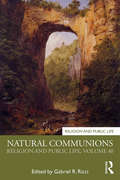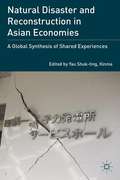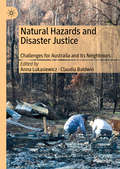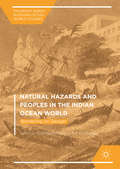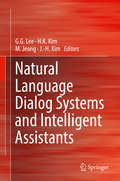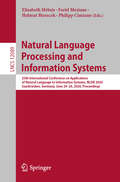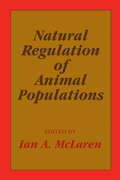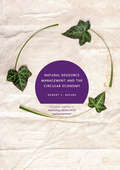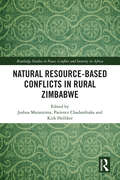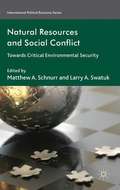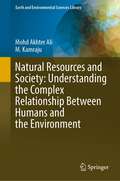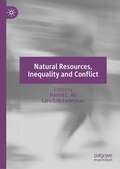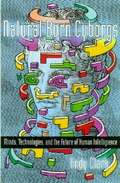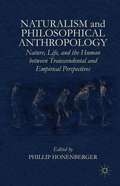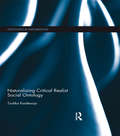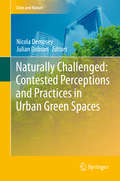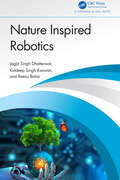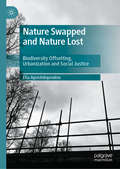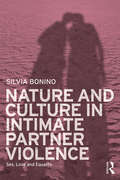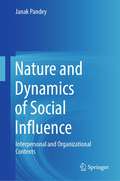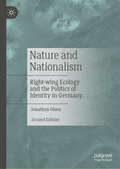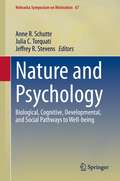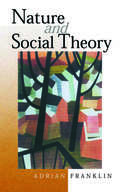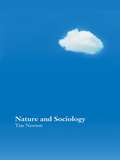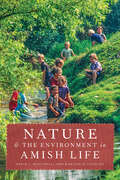- Table View
- List View
Natural Communions: Religion and Public Life, Volume 40 (Religion and Public Life)
by Gabriel R. RicciThe academic treatment of the environment and nature, since the 1980s, has been formalized in sub-disciplines like environmental history, environmental philosophy, ecocriticism, and eco-spirituality. Within these disciplines the concept of nature has been variously employed to reorient humanity to a holistic moral standard. In each case there is general consensus that inquiry ought to turn on moral considerations of the interaction of humans and the environment; with implied admonitions to live sustainably. Lending credence to the Earth as a superorganism in its own right, these modern ecological expressions can be traced to Rachel Carson’s revelations in Silent Spring. However, they have a long pre-history which appears in monistic philosophy, the spirit of Deism, in both Romanticism and the Enlightenment, and in political expressions of the idea of Nature’s God, designed to promote a secular vision of the state and to overturn predatory religious rivalries. With this literary momentum, Natural Communions, volume 40 of Religion and Public Life, gathers interdisciplinary essays which reconfigure humanity within an ecotheological anthropology and which treat the idea of the sacred from the perspective of an Earth-centered spirituality, thus redefining humanity’s response to ecological challenges and initiating a new status within a more expansive cosmology complete with a naturalized conception of Divine Reality.
Natural Disaster and Reconstruction in Asian Economies
by Yau Shuk-Ting KinniaBased on conference proceedings presented at The Chinese University of Hong Kong in November 2012, Natural Disaster and Reconstruction in Asian Economies offers leading insight into and viewpoints on disasters from scholars and journalists working in Japan, China, the United States, and Southeast Asia.
Natural Hazards and Disaster Justice: Challenges for Australia and Its Neighbours
by Claudia Baldwin Anna LukasiewiczThis book explores policy, legal, and practice implications regarding the emerging field of disaster justice, using case studies of floods, bushfires, heatwaves, and earthquakes in Australia and Southern and South-east Asia. It reveals geographic locational and social disadvantage and structural inequities that lead to increased risk and vulnerability to disaster, and which impact ability to recover post-disaster. Written by multidisciplinary disaster researchers, the book addresses all stages of the disaster management cycle, demonstrating or recommending just approaches to preparation, response and recovery. It notably reveals how procedural, distributional and interactional aspects of justice enhance resilience, and offers a cutting edge analysis of disaster justice for managers, policy makers, researchers in justice, climate change or emergency management.
Natural Hazards and Peoples in the Indian Ocean World: Bordering on Danger (Palgrave Series in Indian Ocean World Studies)
by Greg Bankoff Joseph ChristensenThis book examines the dangers and the patterns of adaptation that emerge through exposure to risk on a daily basis. By addressing the influence of environmental factors in Indian Ocean World history, the collection reaches across the boundaries of the natural and social sciences, presenting case-studies that deal with a diverse range of natural hazards – fire in Madagascar, drought in India, cyclones and typhoons in Oman, Australia and the Philippines, climatic variability, storms and flood in Vietnam and the Philippines, and volcanic eruptions, earthquakes and tsunamis in Indonesia. These chapters, written by leading international historians, respond to a growing need to understand the ways in which natural hazards shape social, economic and political development of the Indian Ocean World, a region of the globe that is highly susceptible to the impacts of seismic activity, extreme weather, and climate change.
Natural Language Dialog Systems and Intelligent Assistants
by Gary Geunbae Lee Hong Kook Kim Minwoo Jeong Ji-Hwan KimThis book covers state-of-the-art topics on the practical implementation of Spoken Dialog Systems and intelligent assistants in everyday applications. It presents scientific achievements in language processing that result in the development of successful applications and addresses general issues regarding the advances in Spoken Dialog Systems with applications in robotics, knowledge access and communication. Emphasis is placed on the following topics: speaker/language recognition, user modeling / simulation, evaluation of dialog system, multi-modality / emotion recognition from speech, speech data mining, language resource and databases, machine learning for spoken dialog systems and educational and healthcare applications.
Natural Language Processing and Information Systems: 25th International Conference on Applications of Natural Language to Information Systems, NLDB 2020, Saarbrücken, Germany, June 24–26, 2020, Proceedings (Lecture Notes in Computer Science #12089)
by Philipp Cimiano Farid Meziane Elisabeth Métais Helmut HoracekThis book constitutes the refereed proceedings of the 25th International Conference on Applications of Natural Language to Information Systems, NLDB 2020, held in Saarbrücken, Germany, in June 2020.* The 15 full papers and 10 short papers were carefully reviewed and selected from 68 submissions. The papers are organized in the following topical sections: semantic analysis; question answering and answer generation; classification; sentiment analysis; personality, affect and emotion; retrieval, conversational agents and multimodal analysis. *The conference was held virtually due to the COVID-19 pandemic.
Natural Regulation of Animal Populations
by Ian A. McLarenSurveying an area dense with conflicting observations and ideas, this volume vividly depicts the current state of knowledge as well as the great diversity of opinion in the field of population ecology. Ten papers by outstanding authorities focus on three main issues-the effects of environment and population density on population dynamics, the influence of animal behavior on population growth, and the possibilities of genetic feedback or short-term evolutionary change on control of animal populations. An incisive introduction by the editor establishes a frame of reference and supplies succinct resolutions of some of the important controversies dealt with in these pages.
Natural Resource Management and the Circular Economy
by Robert C. BrearsThis book provides insight into how governments are using a variety of innovative fiscal and non-fiscal instruments to develop circular economies with significant economic and environmental benefits. It emphasises the urgent need for these circular economies and to move away from our current, linear model that has led to environmental degradation, volatility of resource prices and supply risks from uneven distribution of natural resources.Natural Resource Management and the Circular Economy illustrates how governments have promoted the development of an economy that can provide substantial net material savings; mitigate price volatility and supply risks; and improve ecosystem health and long-term resilience of the economy. Through a series of case studies, it details the various innovative policy instruments which can be utilised, including regulations; market-based instruments; incentives; research and innovation support; information exchanges; and support for voluntary approaches. The book also proposes a series of best practices for different countries, both developed and developing, who are implementing their circular economy.
Natural Resource-Based Conflicts in Rural Zimbabwe (Routledge Studies in Peace, Conflict and Security in Africa)
by Kirk Helliker Patience Chadambuka Joshua MatanzimaThis book investigates the range of conflicts over land and other natural resources in contemporary Zimbabwe, considering the different forms these conflicts take, and the ensuing outcomes.Zimbabwe is a country rich in natural resources, including land, wildlife, minerals, and water resources. These resources are integral to the formal and informal livelihoods of most Zimbabweans, as well as supporting many key industries. Wildlife, land, and water resources are also embedded in indigenous knowledge systems, religious beliefs, and rituals in many rural communities, forming an important part of people’s identity and sense of belonging. However, this book demonstrates the ways in which rural communities are being denied access to these resources and being displaced by extractive companies and the government. Their response is often to turn to violence to try to reclaim their lands. Drawing on original empirical research from different conflicts across Zimbabwe, the book also considers the issue in the context of problems such as climate change, human-wildlife conflicts, and politico-economic crises.This book will be useful to policy makers, students, conservationists, and academics across the fields of sociology, human geography, development, political science, and environment studies.
Natural Resources and Social Conflict
by Matthew A. SchnurrThis volume brings together international scholars reflecting on the theory and practice of international security, human security, natural resources and environmental change. It contributes by 'centring the margins' and privileging alternative conceptions and understandings of environmental (in)security.
Natural Resources and Society: Understanding the Complex Relationship Between Humans and the Environment (Earth and Environmental Sciences Library)
by Mohd Akhter Ali M. Kamraju"Natural Resources and Society: Understanding the Complex Relationship Between Humans and the Environment" is a study of the dynamic interplay between humans and the natural world. The book explores the complex relationship between human societies and the environment, examining how human actions can both impact and be influenced by natural resources.The book covers a broad range of topics, including the history of human resource use, the role of natural resources in economic development, and the environmental impacts of resource extraction and consumption. It also considers the social and cultural factors that shape human interactions with the natural world, and the challenges of sustainable resource management. Overall, the book provides a comprehensive overview of the relationship between humans and the environment, emphasizing the importance of understanding this relationship in order to develop more sustainable and equitable societies.
Natural Resources, Inequality and Conflict
by Lars-Erik Cederman Hamid E. AliThis edited volume explores the link between natural resources and civil conflict, focusing especially on protest and violence in the context of mining and the extraction of minerals. The primary goal of the book is to analyze how the conflict-inducing effect of natural resources is mediated by inequality and grievances. Given the topicality of the current boom in mining, the main empirical focus is on non-fuel minerals. The work contains large-N studies of fuel and non-fuel resources and their effect on conflict. It presents case studies focusing on Zambia, India, Guatemala, and Burkina Faso, which investigate the mechanisms between the extraction of natural resources and violent conflict. Finally, the book provides a summary of the previous analyses.
Natural-Born Cyborgs: Minds, Technologies, and the Future of Human Intelligence
by Andrew J. ClarkCognitive scientist Clark believes we are liberating our minds, thanks to our penchant for inventing tools that extend our abilities to think and communicate, starting with the basics of pen and paper and moving on to ever more sophisticated forms of computers. In this lively and provocative treatise, Clark declares that we are, in fact, "human-technology symbionts" or "natural-born cyborgs," always seeking ways to enhance our biological mental capacities through technology, an intriguing claim he supports with a brisk history of "biotechnology mergers," which currently range from pacemakers to the way a pilot of a commercial airplane is but one component in an elaborate "biotechnological problem-solving matrix." Cell phones, Clark explains, are "a prime, if entry-level cyborg technology," as are Internet search engines. As Clark clearly and cheerfully discusses cognitive processes, how we build "better worlds to think in," opaque versus transparent technologies, and the fluidity of our sense of self and adaptation to environmental changes, he offers hope that our brainy species can use its ever-evolving
Naturalism and Philosophical Anthropology: Nature, Life, and the Human Between Transcendental and Empirical Perspectives
by Phillip HonenbergerNaturalism and Philosophical Anthropology.
Naturalizing Critical Realist Social Ontology
by Tuukka KaidesojaThis important book provides detailed critiques of the method of transcendental argumentation and the transcendental realist account of the concept of causal power that are among the core tenets of the bhaskarian version of critical realism. Kaidesoja also assesses the notions of human agency, social structure and emergence that have been advanced by prominent critical realists, including Roy Bhaskar, Margaret Archer and Tony Lawson. The main line of argument in this context indicates that the uses of these concepts in critical realism involve ambiguities and problematic anti-naturalist presuppositions. As a whole, these arguments are intended to show that to avoid these ambiguities and problems, critical realist social ontology should be naturalized. This not only means that transcendental arguments for ontological doctrines are firmly rejected and the notion of causal power interpreted in a non-transcendental realist way. Naturalization of the critical realist social ontology also entails that many of the core concepts of this ontology should be modified so that attention is paid to the ontological presuppositions of various non-positivist explanatory methods and research practices in the current social sciences as well as to new approaches in recent cognitive and neurosciences. In addition of providing a detailed critique of the original critical realism, the book develops a naturalized version of the critical realist social ontology that is relevant to current explanatory practices in the social sciences. In building this ontology, Kaidesoja selectively draws on Mario Bunge’s systemic and emergentist social ontology, William Wimsatt’s gradual notion of ontological emergence and some recent approaches in cognitive science (i.e. embodied, situated and distributed cognition). This naturalized social ontology rejects transcendental arguments in favor of naturalized arguments and restricts the uses of the notion of causal power to concrete systems, including social systems of various kinds. It is also compatible with a naturalized version of scientific realism as well as many successful explanatory practices in the current social sciences. By employing the conceptual resources of this ontology, Kaidesoja explicates many of the basic concepts of social ontology and social theory, including social system, social mechanism, social structure, social class and social status.
Naturally Challenged: Contested Perceptions and Practices in Urban Green Spaces (Cities and Nature)
by Nicola Dempsey Julian DobsonThis book aims to understand how the wellbeing benefits of urban green space (UGS) are analysed and valued and why they are interpreted and translated into action or inaction, into ‘success’ and/or ‘failure’. The provision, care and use of natural landscapes in urban settings (e.g. parks, woodland, nature reserves, riverbanks) are under-researched in academia and under-resourced in practice. Our growing knowledge of the benefits of natural urban spaces for wellbeing contrasts with asset management approaches in practice that view public green spaces as liabilities. Why is there a mismatch between what we know about urban green space and what we do in practice? What makes some UGS more ‘successful’ than others? And who decides on this measure of ‘success’ and how is this constituted? This book sets out to answer these and related questions by exploring a range of approaches to designing, planning and managing different natural landscapes in urban settings.
Nature Inspired Robotics
by Jagjit Singh Dhatterwal Kuldeep Singh Kaswan Reenu BatraThis book introduces the theories and methods of Nature-Inspired Robotics in artificial intelligence. Software and hardware technologies, alongside theories and methods, illustrate the application of bio-inspired artificial intelligence. It includes discussions on topics such as Robot Control Manipulators, Geometric Transformation, Robotic Drive Systems and Nature Inspired Robotic Neural System. Elaborating upon recent progress made in five distinct configurations of nature-inspired computing, it explores the potential applications of this technology in two specific areas: neuromorphic computing systems and neuromorphic perceptual systems.· Discusses advances in cutting-edge technology in brain-inspired computing, perception technologies and aspects of neuromorphic electronics· Offers a thorough introduction to two-terminal neuromorphic memristors, including memristive devices and resistive switching mechanisms· Provides comprehensive explorations of spintronic neuromorphic devices and multi-terminal neuromorphic devices with cognitive behaviours· Includes cognitive behaviour of Inspired Robotics and cognitive technologies with applications in Artificial Intelligence· Contains practical discussions of neuromorphic devices based on chalcogenide and organic materials. This text acts as a reference book for students, scholars, and industry professionals.
Nature Swapped and Nature Lost: Biodiversity Offsetting, Urbanization and Social Justice
by Elia ApostolopoulouThis book unravels the profound implications of biodiversity offsetting for nature-society relationships and its links to environmental and social inequality. Drawing on people’s resistance against its implementation in several urban and rural places across England, it explores how the production of equivalent natures, the core promise of offsetting, reframes socionatures both discursively and materially transforming places and livelihoods.The book draws on theories and concepts from human geography, political ecology, and Marxist political economy, and aims to shift the trajectory of the current literature on the interplay between offsetting, urbanization and the neoliberal reconstruction of conservation and planning policies in the era following the 2008 financial crash. By shedding light on offsetting’s contested geographies, it offers a fundamental retheorization of offsetting capable of demonstrating how offsetting, and more broadly revanchist neoliberal policies, are increasingly used to support capitalist urban growth producing socially, environmentally and geographically uneven outcomes. Nature Swapped and Nature Lost brings forward an understanding of environmental politics as class politics and sees environmental justice as inextricably linked to social justice. It effectively challenges the dystopia of offsetting’s ahistorical and asocial non-places and proposes a radically different pathway for gaining social control over the production of nature by linking struggles for the right to the city with struggles for the right to nature for all.
Nature and Culture in Intimate Partner Violence: Sex, Love and Equality
by Silvia BoninoThis innovative book aims to further our understanding of violence in intimate relationships between men and women by combining research from psychology, cultural studies, and biology. The author examines why western culture often justifies and encourages primitive forms of relationships based on domination and submission and considers not only the cultural influences, but also the biological aspects, in their interaction. The book clarifies the biological roots of aggression and affection in intimate relationships in humans, showing that considering the biological roots of male dominance on women does not imply any justification. Bonino makes the case that awareness about the biological roots of violence, and about the cultural messages supporting them, is necessary for developing different messages and educational practices promoting human capacity of personal affective relationship, where partners empathically recognize themselves as equal human beings. Relationships are examined in relation to a domination/submission framework, with the author emphasizing the role individuals can play in promoting non-aggressive relationships. By examining aggressive behaviour in relation to cultural, social psychological, and biological ideas, the author seeks to clarify the cause of violence in relation to gendered roles. This is fascinating reading for anyone interested in violence in relationships and suitable for students and academics in psychology and the social sciences.
Nature and Dynamics of Social Influence: Interpersonal and Organizational Contexts
by Janak PandeyThe book presents the various ways in which persuasion can be used to make people behave in certain ways without coercion, intimidation, or brute force. It explores the intricacies of social influence processes like self-presentation, impression management, ingratiation, persuasion, manipulative social behavior, and compliance in socio-cultural contexts. Social influence constitutes one of the key themes in the field of social psychology. Contributions in the book highlight social influence behavior and its importance in human social life. The book deepens the reader's understanding of social psychology research on the science and applications of social influence. It invites readers to consider critical questions, such as the interactive effects of personality/disposition and situational factors on social influence. Given its scope, the book is of interest to those in academic fields like social psychology, political science, mass communication, and marketing.
Nature and Nationalism: Right-wing Ecology and the Politics of Identity in Germany
by Jonathan OlsenIn this new edition of his now classic 1999 book, Jonathan Olsen explores the relationship between the far right and the environment, or what he terms “right-wing ecology.” Arguing that radical environmentalism is not exclusively a domain of the left, Olsen shows how many of Germany's far right parties and groups ground their ecological ideology in an anti-universalist anthropology which sees human beings as naturally 'rooted' in specific nations and cultural traditions. Pollution in this discourse signifies not only the disruption of the natural world, but the social world as well, thus providing an environmental justification for an anti-immigrant politics which finds resonance outside the specific milieu of the far right. A rigorously theoretical book, Nature and Nationalism challenges our understanding of the deeply ambiguous ways in which 'nature' functions to legitimate a wide variety of political ideas.
Nature and Psychology: Biological, Cognitive, Developmental, and Social Pathways to Well-being (Nebraska Symposium on Motivation #67)
by Jeffrey R. Stevens Anne R. Schutte Julia C. TorquatiThis volume is comprised of contributions to the 67th Nebraska Symposium on Motivation, which brought together various research disciplines such as psychology, education, health sciences, natural resources, environmental studies to investigate the ways in which nature influences cognition, health, human behavior, and well-being. The symposium is positioned to explore two proposed mechanisms in the most depth: 1) the psycho-evolutionary theory of stress recovery and 2) Attention Restoration Theory. The contributions in the volume represent research guided by both of these posited mechanisms, rigorously examine these theories and processes, and share methodological innovations that can be utilized across programs of research. This volume will be of great interest to researchers on natural environments, practitioners and clinicians working with an environmental lens at the intersection of psychology, social work, education and the health sciences, as well as researchers and students in environmental and conservation psychology. Chapter 5 is available open access under a Creative Commons Attribution 4.0 International License via link.springer.com.
Nature and Social Theory
by Adrian Franklin`Written with clarity and sophistication, it is not just an original argument about relationships of nature and culture, but also a useful text' - Keith Tester, Professor of Sociology, University of Portsmouth Is humanity and society separable from nature? Modern accounts emphasised the difference between humanity and nature and set up independent sciences for each domain, but was this separation ever properly achieved? This book contends that fabricated boundaries between nature and culture have been breached both in practice and in new theoretical accounts. Throughout, Franklin develops upon his premise that nature and culture interpenetrate. The argument begins with a critical discussion of the Romantic idea of pure nature; of a nature unsullied by humanity, marginalized, fragile and in need of protection. The argument is developed by examining more recent discourses that identify nature with environment, and cast humans in the role of polluter and destroyer. The author documents contemporary views about nature which suggest that humanity and nature have never been separate but have always co-existed. Humanity is not only more involved with non-human natures, but also seeks persistently to embed itself in the natural world through embodied, naturalised modes of engagement. This book reveals the staggering depth of this engagement in the ordinary spaces and everyday lives of contemporary societies. Thorough and insightful, this book will be of use and interest to students of sociology, environmental studies and cultural studies.
Nature and Sociology
by Tim NewtonThis book engages with, and contests, the ‘new sociology of nature’. It moves beyond existing debates by presenting new social theory and working across current fields of interest, addressing the debate on new genetics and genomics, taking human biology seriously, and the issues of interdisciplinarity that are likely to arise in longer term attempts to work across the social and natural world. Nature and Sociology will be of great interest to students of a variety of disciplines including sociology and social science, human geography, social and biological anthropology, and the natural sciences.
Nature and the Environment in Amish Life (Young Center Books in Anabaptist and Pietist Studies)
by David L. McConnell Marilyn D. LovelessThe Amish relationship to the environment is much more complicated than you might think.The pastoral image of Amish communities living simply and in touch with the land strikes a deep chord with many Americans. Environmentalists have lauded the Amish as iconic models for a way of life that is local, self-sufficient, and in harmony with nature. But the Amish themselves do not always embrace their ecological reputation, and critics have long questioned the portrayal of the Amish as models of environmental stewardship.In Nature and the Environment in Amish Life, David L. McConnell and Marilyn D. Loveless examine how this prevailing notion of the environmentally conscious Amish fits with the changing realities of their lives. Drawing on 150 interviews conducted over the course of 7 years, as well as a survey of household resource use among Amish and non-Amish people, they explore how the Amish understand nature in their daily lives and how their actions impact the natural world. Arguing that there is considerable diversity in Amish engagements with nature at home, at school, at work, and outdoors, McConnell and Loveless show how the Amish response to regional and global environmental issues, such as watershed pollution and climate change, reveals their deep skepticism of environmentalists. They also demonstrate that Amish households are not uniformly lower in resource use compared to their rural, non-Amish neighbors, though aspects of their home economy are relatively self-sufficient.The first comprehensive study of Amish understandings of the natural world, this compelling book complicates the image of the Amish and provides a more realistic understanding of the Amish relationship with the environment.
